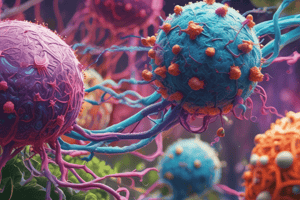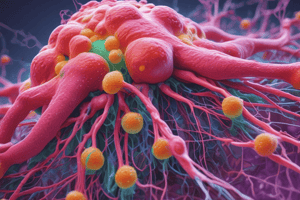Podcast
Questions and Answers
The immune system protects the body from disease causing __________________ viruses, and _______________________.
The immune system protects the body from disease causing __________________ viruses, and _______________________.
The immune system protects the body from disease-causing __________________ viruses and _______________________.
The immune system protects the body from disease-causing __________________ viruses and _______________________.
bacteria, viruses
___________________ immunity is present at birth; _______________ immunity is acquired by the body.
___________________ immunity is present at birth; _______________ immunity is acquired by the body.
Nonspecific, specific
In _____________ immunity, the body manufactures antibodies as a response to a foreign substance; active immunity is also acquired by a _________________.
In _____________ immunity, the body manufactures antibodies as a response to a foreign substance; active immunity is also acquired by a _________________.
With __________________ passive immunity, a person is given the antibodies needed to defend against the antigen.
With __________________ passive immunity, a person is given the antibodies needed to defend against the antigen.
The lymphatic system is composed of lymph, lymph vessels, lymph_____________, the spleen, and the ____________________ gland.
The lymphatic system is composed of lymph, lymph vessels, lymph_____________, the spleen, and the ____________________ gland.
The clear yellowish fluid that moves into the lymph system and carries disease-fighting cells, lymphocytes, is called____________________.
The clear yellowish fluid that moves into the lymph system and carries disease-fighting cells, lymphocytes, is called____________________.
A main function of the spleen is to serve as a storage shed for _______________________
A main function of the spleen is to serve as a storage shed for _______________________
Infections may increase with age.
Infections may increase with age.
Vaccines are just as effective for older people as they are for younger people.
Vaccines are just as effective for older people as they are for younger people.
Antibody response speeds up with age.
Antibody response speeds up with age.
T-cells decrease in number as a person gets older.
T-cells decrease in number as a person gets older.
How does HIV harm the body?
How does HIV harm the body?
List three common methods of HIV transmission.
List three common methods of HIV transmission.
List four common misconceptions about HIV transmission.
List four common misconceptions about HIV transmission.
What is an opportunistic infection?
What is an opportunistic infection?
How should the nursing assistant respond to a resident worried about contracting AIDS through touch?
How should the nursing assistant respond to a resident worried about contracting AIDS through touch?
Care for residents who have HIV or AIDS should focus on
Care for residents who have HIV or AIDS should focus on
Confidentiality is especially important to people with HIV/AIDS because
Confidentiality is especially important to people with HIV/AIDS because
Which of the following is a guideline for preventing infection in residents with HIV?
Which of the following is a guideline for preventing infection in residents with HIV?
If a resident with AIDS has a poor appetite and is losing weight, the nursing assistant should
If a resident with AIDS has a poor appetite and is losing weight, the nursing assistant should
Which is true of special diets for residents with AIDS?
Which is true of special diets for residents with AIDS?
Someone who has nausea and vomiting may need to
Someone who has nausea and vomiting may need to
The BRAT diet is helpful for
The BRAT diet is helpful for
Fluids are important for residents who have diarrhea because
Fluids are important for residents who have diarrhea because
Non-cancerous is referred to as _____________.
Non-cancerous is referred to as _____________.
The removal of a small piece of tissue for examination is called a _____________.
The removal of a small piece of tissue for examination is called a _____________.
Cancer is a general term used to describe a disease in which _____________.
Cancer is a general term used to describe a disease in which _____________.
Chemical agents or medications are administered to kill malignant cells and tissues in _____________.
Chemical agents or medications are administered to kill malignant cells and tissues in _____________.
Can be affected when tumors rely on specific hormones to survive and grow is called _____________.
Can be affected when tumors rely on specific hormones to survive and grow is called _____________.
Cancer vaccines are one form of _____________.
Cancer vaccines are one form of _____________.
Cancerous is referred to as _____________.
Cancerous is referred to as _____________.
To spread by transferring a disease-causing agent from the site of the disease to other parts of the body is known as _____________.
To spread by transferring a disease-causing agent from the site of the disease to other parts of the body is known as _____________.
The branch of medicine that deals with the study and treatment of cancer is _____________.
The branch of medicine that deals with the study and treatment of cancer is _____________.
Type of care that works to relieve symptoms and reduce pain and suffering is called _____________.
Type of care that works to relieve symptoms and reduce pain and suffering is called _____________.
Uses high energy rays to attempt to destroy cancer cells in a specific area is known as _____________.
Uses high energy rays to attempt to destroy cancer cells in a specific area is known as _____________.
The disappearance of signs and symptoms of cancer or other diseases can be described as _____________.
The disappearance of signs and symptoms of cancer or other diseases can be described as _____________.
The goal of surgery for cancer is to _____________.
The goal of surgery for cancer is to _____________.
A group of abnormally growing cells is referred to as a _____________.
A group of abnormally growing cells is referred to as a _____________.
Why is it important to prevent infection from occurring in cancer residents?
Why is it important to prevent infection from occurring in cancer residents?
The final stage of HIV infection, in which infections, tumors, and central nervous system symptoms appear due to a weakened immune system, is called _____________.
The final stage of HIV infection, in which infections, tumors, and central nervous system symptoms appear due to a weakened immune system, is called _____________.
A disease in which the body is unable to recognize its own tissue and begins to attack these tissues is called _____________.
A disease in which the body is unable to recognize its own tissue and begins to attack these tissues is called _____________.
Fear of homosexuality or fear of appearing homosexual is called _____________.
Fear of homosexuality or fear of appearing homosexual is called _____________.
A virus that attacks the body's immune system and gradually disables it, eventually can cause AIDS, is known as _____________.
A virus that attacks the body's immune system and gradually disables it, eventually can cause AIDS, is known as _____________.
A type of severe pain that happens unexpectedly in people who have cancer is called _____________.
A type of severe pain that happens unexpectedly in people who have cancer is called _____________.
An illness caused by microorganisms that do not affect people with healthy immune systems but cause disease in people with weakened immune systems is called _____________.
An illness caused by microorganisms that do not affect people with healthy immune systems but cause disease in people with weakened immune systems is called _____________.
A group of abnormally growing cells that develops when cancerous cells divide and grow uncontrollably is known as _____________.
A group of abnormally growing cells that develops when cancerous cells divide and grow uncontrollably is known as _____________.
Flashcards
The Immune System
The Immune System
Protects the body against disease-causing microorganisms, like bacteria and viruses.
Nonspecific Immunity
Nonspecific Immunity
Present from birth; a general defense against pathogens.
Specific Immunity
Specific Immunity
Acquired over time; targets specific threats.
Active Immunity
Active Immunity
Signup and view all the flashcards
Passive Immunity
Passive Immunity
Signup and view all the flashcards
Lymph
Lymph
Signup and view all the flashcards
Main function of the spleen
Main function of the spleen
Signup and view all the flashcards
HIV
HIV
Signup and view all the flashcards
HIV Transmission Methods
HIV Transmission Methods
Signup and view all the flashcards
Opportunistic Infections
Opportunistic Infections
Signup and view all the flashcards
Care Aim for HIV/AIDS patients
Care Aim for HIV/AIDS patients
Signup and view all the flashcards
Confidentiality for HIV/AIDS
Confidentiality for HIV/AIDS
Signup and view all the flashcards
Why not share personal items?
Why not share personal items?
Signup and view all the flashcards
Why special diets low in acidity?
Why special diets low in acidity?
Signup and view all the flashcards
For Nausea & Vomiting
For Nausea & Vomiting
Signup and view all the flashcards
BRAT Diet
BRAT Diet
Signup and view all the flashcards
Cancer
Cancer
Signup and view all the flashcards
Malignant
Malignant
Signup and view all the flashcards
Benign
Benign
Signup and view all the flashcards
Biopsies
Biopsies
Signup and view all the flashcards
Chemotherapy
Chemotherapy
Signup and view all the flashcards
Radiation Therapy
Radiation Therapy
Signup and view all the flashcards
Hormone Therapy
Hormone Therapy
Signup and view all the flashcards
Immunotherapy
Immunotherapy
Signup and view all the flashcards
Palliative Care
Palliative Care
Signup and view all the flashcards
Surgery
Surgery
Signup and view all the flashcards
Remission
Remission
Signup and view all the flashcards
Autoimmune Disease
Autoimmune Disease
Signup and view all the flashcards
Breakthrough Pain
Breakthrough Pain
Signup and view all the flashcards
Homophobia
Homophobia
Signup and view all the flashcards
Study Notes
The Immune System
- Protects the body against disease-causing microorganisms, including bacteria and viruses.
- Contains both nonspecific immunity (present at birth) and specific immunity (acquired).
Types of Immunity
- Active immunity: Body produces antibodies in response to foreign substances; can also be developed through vaccination.
- Passive immunity: Person receives antibodies from another source for immediate protection.
The Lymphatic System
- Composed of lymph (clear fluid with disease-fighting cells), lymph vessels, nodes, the spleen, and the thymus gland.
- Main function of the spleen: storage of blood.
HIV/AIDS
- HIV specifically harms the immune system, weakening and disabling its cells.
- Transmission methods include unprotected sexual contact and having multiple partners.
- Misconceptions about HIV: cannot be contracted through casual contact, air, water, or food.
Opportunistic Infections
- These illnesses affect individuals with weakened immune systems but do not typically harm those with healthy immunity.
- Care for patients with HIV/AIDS aims to relieve symptoms and prevent infections.
Special Care Requirements for HIV/AIDS
- Confidentiality is crucial due to societal stigma.
- Personal items should not be shared to prevent infection.
- Residents may require special diets that are low in acidity.
Nutrition for Patients with AIDS
- Individuals with nausea and vomiting should eat small, frequent meals.
- The BRAT diet is helpful for managing diarrhea, which causes fluid loss.
Cancer Overview
- Cancer is characterized by uncontrolled growth of abnormal cells and can be termed malignant (cancerous) or benign (non-cancerous).
- Biopsies involve removing tissue samples for examination.
Cancer Treatments
- Chemotherapy uses drugs to kill malignant cells.
- Radiation therapy employs high-energy rays to target and destroy cancer cells.
- Hormone therapy can be effective when tumors rely on hormones to grow.
- Immunotherapy includes cancer vaccines to stimulate the immune response.
Cancer Care Principles
- Palliative care focuses on symptom relief and pain management.
- Surgery aims to remove cancerous tissues and tumors.
- Remission indicates the disappearance of cancer symptoms, either temporarily or permanently.
Additional Concepts
- Autoimmune disease: Body's immune system mistakenly attacks its own tissues.
- Breakthrough pain: Severe, unexpected pain in cancer patients reflecting the disease's complexity.
- Homophobia: Fear or discrimination against individuals based on sexual orientation.
Studying That Suits You
Use AI to generate personalized quizzes and flashcards to suit your learning preferences.




